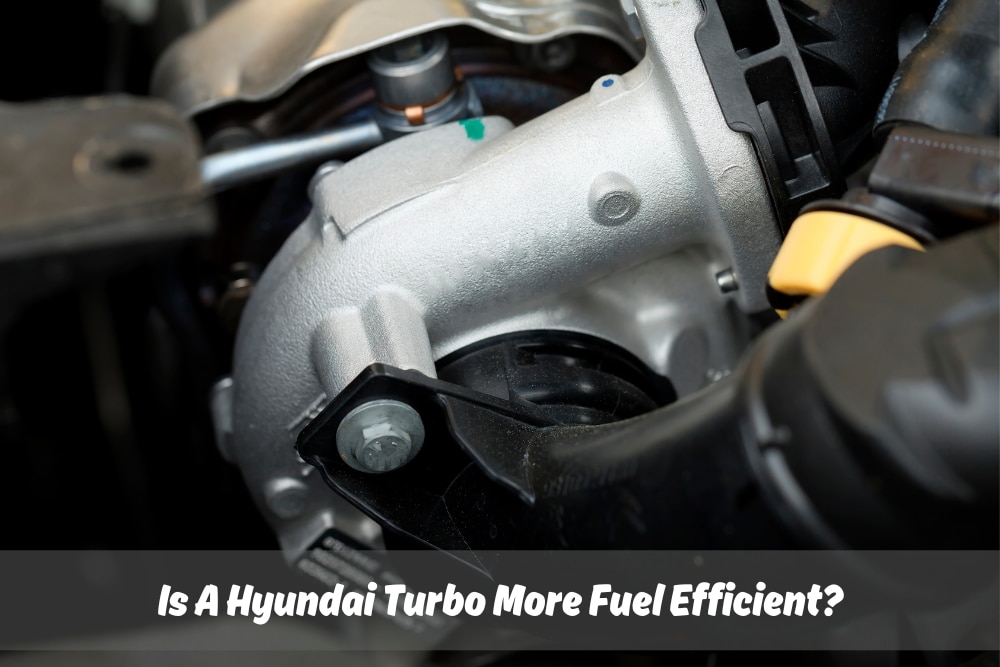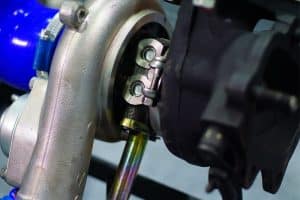Ever craved a Hyundai that rockets down the road while sipping fuel like a hybrid? Turbocharged engines promise both power and efficiency, but there might be a catch – a potential fuel efficiency trade-off. Buckle up and prepare to explore the world of the Hyundai turbo. This technology promises impressive power, but can it truly deliver on fuel savings, or will it leave your wallet feeling lighter at the pump? Dive into the science behind Hyundai turbochargers and see if they can be your fuel-efficient accomplice.
How do Hyundai turbocharged engines work?
Imagine a tiny windmill attached to your car’s exhaust system. As hot exhaust gases whoosh out, they spin the windmill blades, which in turn, power a compressor that shoves more air into the engine. More air means more fuel can be burned, creating a bigger bang – or in car terms, more power.
This is the basic idea behind a turbocharger. By cramming more air in, Hyundai turbo engines can achieve similar power outputs with smaller engines. In theory, smaller engines generally require less fuel to operate, leading to potentially better fuel efficiency.
Why might a Hyundai turbo be more fuel efficient?
There’s a reason car manufacturers are increasingly turning to turbochargers. Here’s why they can be fuel-efficient friends:
- Downsizing power: Traditionally, bigger engines meant more power, but also thirstier fuel consumption. Modern turbochargers allow Hyundai to use smaller engines that deliver the same punch as their larger counterparts. This downsizing can lead to significant fuel economy improvements.
- Efficiency boost: Modern turbochargers are marvels of engineering. They’re designed to minimise energy waste, ensuring most of the exhaust gasses’ energy gets used to compress air. This translates to more efficient use of fuel.
But wait, there’s more! Turbochargers come in different sizes and configurations, each with its own impact on fuel efficiency. Smaller turbos spool up (reach operating speed) quicker, offering improved responsiveness at lower revs, which is often the driving sweet spot for fuel economy.
When might a Hyundai turbo decrease fuel efficiency?
While turbos can be fuel-saving superstars, there are times they might not be your best buddy at the petrol station. Here’s how your driving habits and the turbo itself can affect fuel efficiency:
- Leadfoot blues: Turbos love a good workout, but constantly pushing the engine to its limits with a heavy foot isn’t ideal. Aggressive driving that forces the turbo to spool up frequently leads to gulping down more fuel.
- The wrong match: Choosing the wrong turbo for your driving style or car can be a recipe for inefficiency. A large turbo designed for high-performance applications might struggle at lower speeds. This “turbo lag” makes the engine work harder to compensate, burning more fuel in the process.
What Hyundai models offer turbocharged engines (and how efficient are they)?
While not all Hyundai models offer turbocharged engines, several popular options come with this powerful and potentially fuel-efficient technology. Here’s a breakdown of a few:
- Hyundai Tucson: Known for its sporty character, the Tucson boasts a 1.6L turbocharged engine option. Don’t let its size fool you – it delivers impressive power while achieving a combined fuel economy rating of around 7.0L/100km (based on the latest ADR figures).
- Hyundai Santa Fe: This family-friendly SUV caters to those who want muscle without sacrificing economy. The Santa Fe offers a 2.0L turbo option that provides strong performance with a combined fuel economy rating of around 8.5L/100km (according to ADR figures).
- Hyundai Kona: This subcompact SUV punches above its weight with a spunky 1.6L turbocharged engine option. It offers a balance of performance and efficiency, achieving a combined fuel economy rating of around 7.0L/100km (based on ADR figures).
- Hyundai i30 N: For driving enthusiasts, the i30 N is a hot hatch with a serious attitude. Its 2.0L turbocharged engine pushes the limits of performance, with fuel economy coming in around 8.1L/100km (based on ADR figures).
It’s important to note: These are just a few examples, and fuel efficiency can vary depending on factors like driving conditions, vehicle maintenance, and individual driving styles.
Can you drive a Hyundai turbo for fuel efficiency? Tips and techniques
So, you’ve got a Hyundai turbo, and you want to maximise its fuel-saving potential? Here are some tips:
- Embrace the chill: Avoid aggressive driving and maintain a steady cruising speed whenever possible. This allows the turbo to work efficiently and reduces unnecessary fuel consumption.
- Shift wisely: Modern Hyundai automatics are pretty smart, but if you have a manual, upshifting early can keep the engine revs low and the turbo operating efficiently.
- Maintain your turbo: Regular servicing is crucial for any car, but especially for a turbocharged engine. A well-maintained turbocharger ensures optimal performance and fuel efficiency.
Is a Hyundai turbo right for you? The fuel efficiency verdict
There’s no one-size-fits-all answer. If you prioritise fuel efficiency and have a relaxed driving style, a Hyundai turbo could be a great choice. The smaller engines with turbo assistance often deliver impressive fuel economy figures. However, if you crave constant acceleration and a heavy foot is your default setting, a naturally aspirated engine might be a better fit.
Ultimately, the decision depends on your driving needs and preferences. Consider taking a Hyundai turbocharged model for a test drive and see how it feels.
Hyundai iLoad Engine Specialist: Maximise your turbo’s efficiency
Want to maximise the power and efficiency of your Hyundai turbo engine, especially your hardworking Hyundai iLoad? Our team at Iload Engine Specialists are experts in caring for Hyundai iLoad engines, including turbocharged models. We can help you:
- Maintain peak performance: Regular servicing with genuine Hyundai parts keeps your turbocharger running smoothly and efficiently.
- Identify and solve turbo issues: Strange noises or a lack of power? Our technicians can diagnose and fix any problems affecting your Hyundai’s turbo performance.
- Optimise fuel efficiency: We can help you develop fuel-efficient driving habits and ensure your turbo is operating at its best for maximum economy.
Don’t let your hard-earned fuel dollars go to waste. Book your Hyundai iLoad, or any Hyundai for that matter, with a turbocharger, for a service with our expert technicians. Contact us today and experience the difference a turbocharged engine can make, without breaking the bank at the pump.




